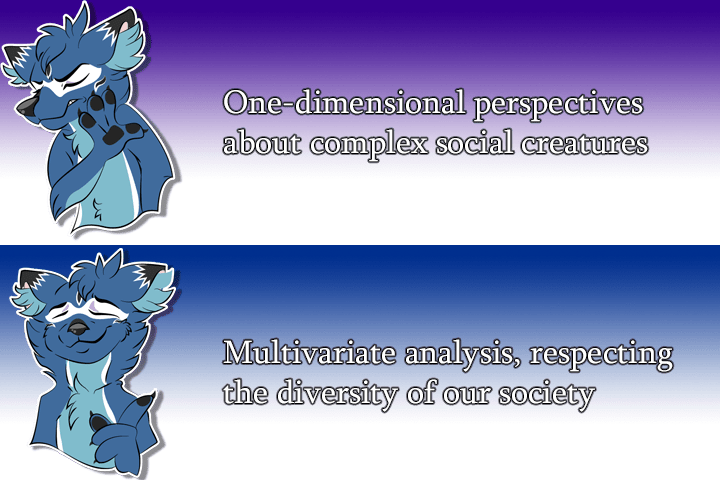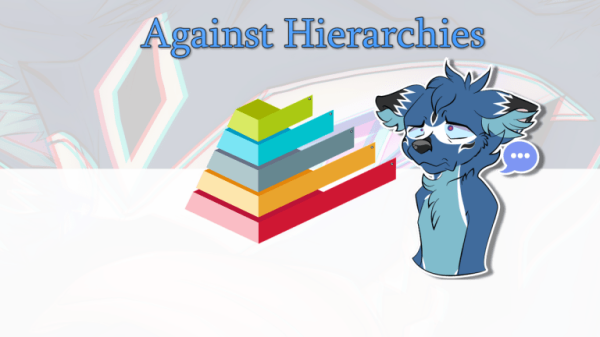One of the funniest concepts for a YouTube channel has to be TierZoo, which treats the animal kingdom as an MMORPG and animal species as different classes within this hypothetical game, and then proceeds to analyze it the same way gamers analyze the “meta” for a given season of a game.
Tier lists are just one expression of a mental model called a hierarchy. Hierarchies can be useful concepts in science (e.g. Maslow’s Hierarchy of Needs), but they’re woefully deceptive and should not be used socially.
Why Hierarchies Are A Poor Fit for Social Purposes
In video game terms (for the TierZoo fans in the audience), the PvP meta rarely implies the PvE meta. This is the essence of the problems with viewing society through the lens of a hierarchy.
Using hierarchies for any social purpose is like comparing two individual frames from different videos of people speaking. If you select an unflattering frame from one person mid-word and juxtapose it with a frame of the other person pausing for dramatic effect, you can bias your audience’s perceptions of the two people.

Some people like hierarchies because they seem real and “natural”: If you worked hard in school, you might graduate in the top 10% of your class.
“Wouldn’t it naturally follow that scholastic achievements yield a hierarchy that reveals both intellect and diligence? Shouldn’t the top performers earn the most rewards?”
No, and no. Academic grading isn’t a robust scientific model for measuring capability, it’s an ad hoc tool for scaling up one teacher to many dozens or even hundreds of students. People with economic advantages (e.g. not needing to work 2-3 different jobs just to afford college) are also more likely to have time to prepare for tests, and therefore earn higher grades.
But more importantly, we’re still talking about narrowly scoped snapshots of reality that miss entire dimensions. How many mathletes in school were loathe to put out an essay on some arbitrary prompt in under an hour? How many prolific writers left school thinking, “I suck at math”?
Hierarchies Can Be Real, But Still Useless
The social hierarchies people talk about the most are usually about power–which either means money, violence, or social connections with others more capable of wielding money and/or violence.
This video from Innuendo Studios explains this concept rather well, especially as it pertains to how political conservatives (and, indeed, most people living in capitalist societies) tend to view them:
https://www.youtube.com/watch?v=agzNANfNlTs
Hierarchies can feel factual. There is a deceptively attractive pecking order to e.g. wealth.
Hierarchies often pretend to be the pinnacle of objectivity and impartiality, but this is really a beautiful lie we tell ourselves.
https://www.youtube.com/watch?v=E8ISzmBBTvo
If you only measure one variable across a population, a hierarchy will likely emerge. And it might seem very much like a fact.
If you collect a diverse sample of many independent variables, this hierarchy will begin blur and everyone will tend towards mediocrity.
Jeff Bezos and Bill Gates certainly have more wealth than I do, but I’m probably better at mathematics and cryptography than both of them. Which variable matters in a given situation is heavily context-dependent.
At the end of the day, social hierarchies are lazy oversimplifications, and the people who rely on them when they think about the world are lying to themselves through omission.
Listicles Considered Harmful
The worst offenders in using simple-minded hierarchies to analyze societies are the bloggers and YouTubers who create “Top 10” articles and videos.
https://www.youtube.com/watch?v=TIEleCEtqzA
It isn’t enough for these jerks to just enjoy the plot twists and betrayals in their favorite works of fiction; they have to pit them against each other so they can rank them.
Responsible Use of Hierarchies
It’s particularly difficult to get away from hierarchies in our society, especially when it’s staring you in the face. (“Why can’t we complete a Mythic Plus 10 on our favorite characters?” “Because they’re not this season’s meta.”)
“So what are we supposed to do then? Lie to ourselves?” Nope.
You can acknowledge that hierarchies exist (when they actually do) while also acknowledging that they’re only parts of the whole picture.
Additionally, some hierarchies only exist because of correctable sources of corruption and bias within our society, and those should be resisted.
Hierarchies Beget Depression
One of the quickest and surest ways to make yourself feel depressed or anxious is to compare your behind-the-scenes footage to other people’s highlight reels. This is one of the great ills of social media.
Hierarchies exacerbate this problem by introducing numbers and metrics that appear to be objective, but really aren’t.
Need an example? Here’s two videos that, I think, illustrate what I’m talking about perfectly.
https://www.youtube.com/watch?v=-GC0yK_znVw
https://www.youtube.com/watch?v=1G24qcsxDdM
By the numbers (as of the time of this writing):
- RL has only had a YouTube channel since 2017, and already has nearly 1000 more subscribers than Doon (3.97k vs 3.19k).
- RL’s video has more views than Doon’s (608 vs 488).
- RL’s video has more upvotes than Doon’s (100 vs 98).
Does this mean RL is more successful than Doon? The numbers sure say so! And yet, RL is clearly unsatisfied, while Doon seems perfectly content with his channel and its growth over the years.
Who appears to be happier in these videos?
In Conclusion
Hierarchies can lie, and they always lie through omission.
Humans are complex creatures that have many dimensions to our lives, and cannot be reliably compressed to a few bits of information. Any attempt to do so loses something; and what it loses, is often our humanity.
https://soatok.blog/2021/04/21/against-hierarchies/
One of the funniest concepts for a YouTube channel has to be TierZoo, which treats the animal kingdom as an MMORPG and animal species as different classes within this hypothetical game, and then proceeds to analyze it the same way gamers analyze the “meta” for a given season of a game.Tier lists are just one expression of a mental model called a hierarchy. Hierarchies can be useful concepts in science (e.g. Maslow’s Hierarchy of Needs), but they’re woefully deceptive and should not be used socially.
Why Hierarchies Are A Poor Fit for Social Purposes
In video game terms (for the TierZoo fans in the audience), the PvP meta rarely implies the PvE meta. This is the essence of the problems with viewing society through the lens of a hierarchy.Using hierarchies for any social purpose is like comparing two individual frames from different videos of people speaking. If you select an unflattering frame from one person mid-word and juxtapose it with a frame of the other person pausing for dramatic effect, you can bias your audience’s perceptions of the two people.
Without knowing the personalities involved, which person looks like an utter blowhard in this framing?
Some people like hierarchies because they seem real and “natural”: If you worked hard in school, you might graduate in the top 10% of your class.
“Wouldn’t it naturally follow that scholastic achievements yield a hierarchy that reveals both intellect and diligence? Shouldn’t the top performers earn the most rewards?”
No, and no. Academic grading isn’t a robust scientific model for measuring capability, it’s an ad hoc tool for scaling up one teacher to many dozens or even hundreds of students. People with economic advantages (e.g. not needing to work 2-3 different jobs just to afford college) are also more likely to have time to prepare for tests, and therefore earn higher grades.
But more importantly, we’re still talking about narrowly scoped snapshots of reality that miss entire dimensions. How many mathletes in school were loathe to put out an essay on some arbitrary prompt in under an hour? How many prolific writers left school thinking, “I suck at math”?
Hierarchies Can Be Real, But Still Useless
The social hierarchies people talk about the most are usually about power–which either means money, violence, or social connections with others more capable of wielding money and/or violence.This video from Innuendo Studios explains this concept rather well, especially as it pertains to how political conservatives (and, indeed, most people living in capitalist societies) tend to view them:
https://www.youtube.com/watch?v=agzNANfNlTs
Hierarchies can feel factual. There is a deceptively attractive pecking order to e.g. wealth.
Hierarchies often pretend to be the pinnacle of objectivity and impartiality, but this is really a beautiful lie we tell ourselves.
https://www.youtube.com/watch?v=E8ISzmBBTvo
If you only measure one variable across a population, a hierarchy will likely emerge. And it might seem very much like a fact.
If you collect a diverse sample of many independent variables, this hierarchy will begin blur and everyone will tend towards mediocrity.
Jeff Bezos and Bill Gates certainly have more wealth than I do, but I’m probably better at mathematics and cryptography than both of them. Which variable matters in a given situation is heavily context-dependent.
At the end of the day, social hierarchies are lazy oversimplifications, and the people who rely on them when they think about the world are lying to themselves through omission.
Listicles Considered Harmful
The worst offenders in using simple-minded hierarchies to analyze societies are the bloggers and YouTubers who create “Top 10” articles and videos.https://www.youtube.com/watch?v=TIEleCEtqzA
It isn’t enough for these jerks to just enjoy the plot twists and betrayals in their favorite works of fiction; they have to pit them against each other so they can rank them.
Responsible Use of Hierarchies
It’s particularly difficult to get away from hierarchies in our society, especially when it’s staring you in the face. (“Why can’t we complete a Mythic Plus 10 on our favorite characters?” “Because they’re not this season’s meta.”)“So what are we supposed to do then? Lie to ourselves?” Nope.
You can acknowledge that hierarchies exist (when they actually do) while also acknowledging that they’re only parts of the whole picture.
Additionally, some hierarchies only exist because of correctable sources of corruption and bias within our society, and those should be resisted.
Hierarchies Beget Depression
One of the quickest and surest ways to make yourself feel depressed or anxious is to compare your behind-the-scenes footage to other people’s highlight reels. This is one of the great ills of social media.Hierarchies exacerbate this problem by introducing numbers and metrics that appear to be objective, but really aren’t.
Need an example? Here’s two videos that, I think, illustrate what I’m talking about perfectly.
https://www.youtube.com/watch?v=-GC0yK_znVw
https://www.youtube.com/watch?v=1G24qcsxDdM
By the numbers (as of the time of this writing):
- RL has only had a YouTube channel since 2017, and already has nearly 1000 more subscribers than Doon (3.97k vs 3.19k).
- RL’s video has more views than Doon’s (608 vs 488).
- RL’s video has more upvotes than Doon’s (100 vs 98).
Does this mean RL is more successful than Doon? The numbers sure say so! And yet, RL is clearly unsatisfied, while Doon seems perfectly content with his channel and its growth over the years.
Who appears to be happier in these videos?
In Conclusion
Hierarchies can lie, and they always lie through omission.Humans are complex creatures that have many dimensions to our lives, and cannot be reliably compressed to a few bits of information. Any attempt to do so loses something; and what it loses, is often our humanity.
https://soatok.blog/2021/04/21/against-hierarchies/



